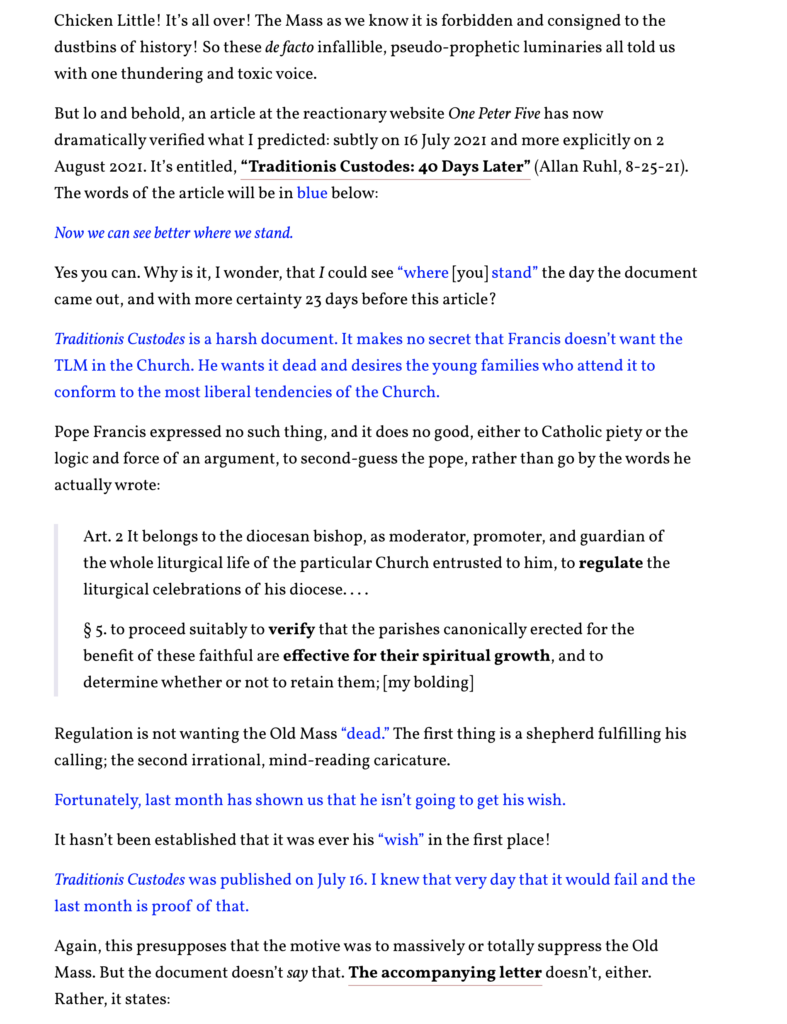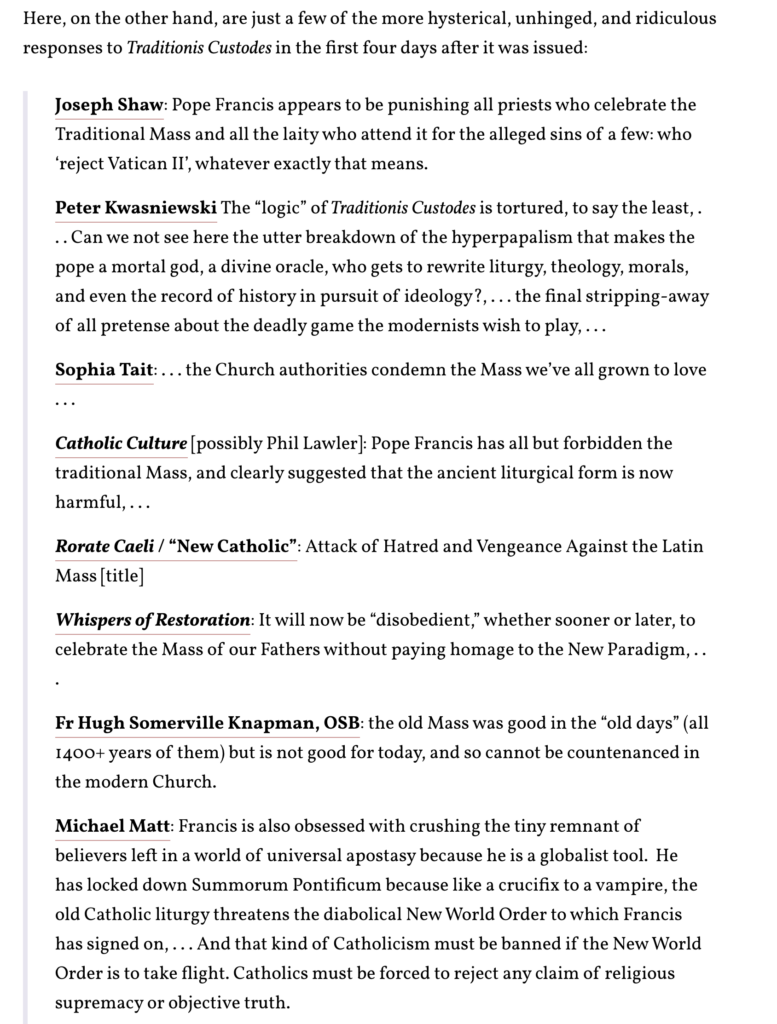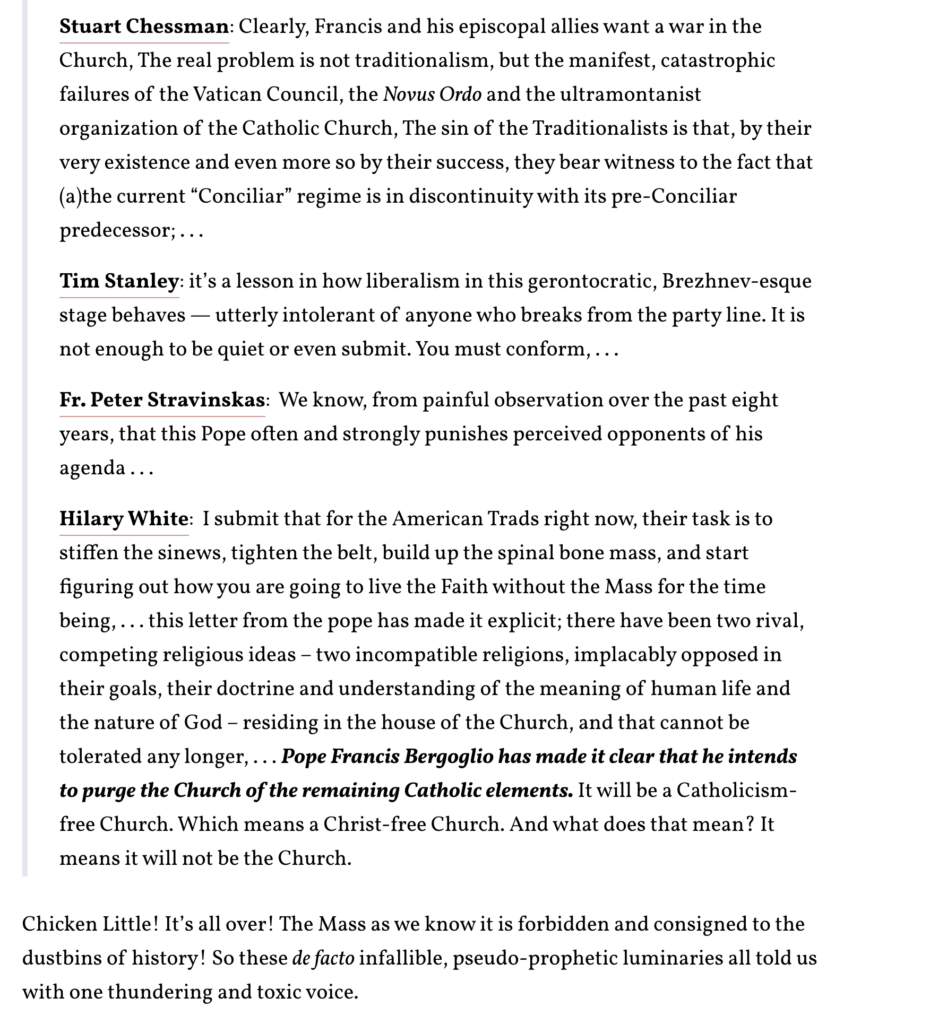THERE IS ALWAYS a little frisson of alarm through my frail flesh whenever Google Alerts tells me my name has appeared afresh on the internet. Thankfully it is rare, and overwhelmingly the mention proves to be benign, often merely incidental. Occasionally it is not. Today is such a day.
Catholic apologetics is a noble apostolate. Classic figures include such greats as the lay Australian publisher Frank Sheed, or the American prelate Fulton Sheen. In more recent years converts such as Scott Hahn have made important contributions to sound apologetics, Dr Hahn able to write attractively for cradles and yet speak in a vocabulary that engages those formed as Protestants. He writes with the happy zeal that marks the best of the evangelical tradition, and it is contagious.
Not all convert apologists are so positive. America seems to have a goodly share of convert apologists who began well and have deteriorated into polemicists. They even seem to manifest what is called by many now hyper-papalism, and any word of criticism, however mild, oblique or muted, against Pope Francis is the dog-whistle for them to attack. And attack is the word.
They do not practise apologetics any more; the trade they now ply is polemics. It is not attractive. In fact, there is something sinister about it. Mark Shea is one such. Indeed his worsening online content caused the termination of his connection with EWTN and its journal, National Catholic Register.

Another is Dave Armstrong.
Armstrong began his convert’s apologetical career with very useful works demonstrating to Protestants how the Catholic Church is more biblically faithful than the so-called bible-based evangelical, reformed and generally Protestant denominations. They were just as useful for cradle Catholics. But now he has become a polemicist, but with a twist. More on that later.
In an article on the online religious platform Patheos, Traditionis Custodes Results: No Fallen Sky (I Called It) [note the title], Armstrong declares,
I hate to say “I told you so!” but yes, this article is essentially that, I freely confess. I catch so much hell from radical Catholic reactionaries for my criticism of their errors and excesses that I do think it is worthwhile (not to mention educational: if they will accept it) to point out to them that I was dead-on in my predictions about what would happen after the issuance of Pope Francis’ Motu proprio Traditionis Custodes (16 July 2021), which regulated the Tridentine Mass and placed the authority of approval with bishops rather than priests.
The article begins with the perpendicular pronoun, and this is the key to understanding the apologetic polemics of such as Armstrong. It is all about them. A man has to earn his living, of course, but when a Catholic apologist becomes the product, there is a grave problem.
I am not going to link to the article as it is not nourishing fare for Catholics of any stripe. You can Google it. A few screenshots will suffice here.
The proof of the transition from apologetics to personalised polemics is literally plain to see. For example,

Things to note: the language of invective and polemic; his marvellous insight; and his utter naivety…or is it disingenuousness? For example, most leaders who want to avoid a riot do not explicitly state their ultimate intention; one works through proximate intentions as stepping stones to the ultimate. Inch by inch, row by row, festina lente. His reading of the passages he actually quotes stands reasonably well. But in the context of other sections, a different picture emerges.
For example, article 4 of Traditionis custodes states that “Priests ordained after the publication of the present Motu Proprio, who wish to celebrate using the Missale Romanum of 1962, should submit a formal request to the diocesan Bishop who shall consult the Apostolic See before granting this authorization.” This is hardly the return of liturgical authority to the local bishop! What is the reason for this requirement to get Rome’s consent? This question becomes especially moot in light of article 3, sections 2, 5 and 6, which forbid the celebration of the old Mass in a “parochial church,” forbid the erection of new parishes that serve those who adhere to the old Mass, allow the bishop to decide whether current traditional parishes can continue to exist, and forbids the creation of any new ones.
The force of these articles alone creates what the British government would call a “hostile environment” for the old Mass. That can be seen from the glee of partisans of the motu proprio like Andrea Grillo, Massimo Faggioli and Austen Ivereigh who interpret it precisely as the death knell, long overdue, for the old Mass.
So Armstrong, ignoring the bishops who have outright forbidden the old Mass in toto, looks at the many bishops who have not suppressed the old Mass but have allowed the status quo ante to continue. What he does not acknowledge is that in these cases the bishops have been clear that this indulgence is temporary, while they decide a more lasting response, since the motu proprio caught them on the hop (collegiality did not extend to warning the bishops it seems).
So, Dave is right that the sky has not fallen in for traditionalists…yet. We’ll see how prophetic he is in a year’s time.
But it is really about Dave anyway. It is him the whole way through:
There seems to be a radical insecurity underlying polemics like this. Having converted to popery, these ex-evangelical converts must now double-down on hyper-papalism to shore up their own faith. Or so it seems.
My involvement comes in that I am listed, indiscriminately among writers of often quite different hue and tone, as one of those who offered an “hysterical, unhinged, and ridiculous” response to the motu proprio. Moreover, he has not bothered to note subsequent posts which reflect further not only on the document itself but also on the impolitic attitudes of some traditionalists. But perspective and context would spoil the force of his self-promoting polemic:


It is of note that Armstrong does not really engage with the arguments of any of these writers, most but not all of whom are traditionalists. Nor does he engage in any way with the upset that prompts them to express their misgivings and hurt. He does not care about them or their feelings. Nor does he try to argue how the attempt to curtail the most vigorous part of the western, first-world Church might be justified in any pastoral or evangelistic way, nor what it says that most of the vigour and new life in our section of the Church lies precisely in the more traditional observance.
For you see, he is a polemicist, not an apologist. Vitriol drips from his pen. It is sad to behold. Read him by all means, but at your own risk, for you will be exposed to what is essentially Catholicism à l’Armstrong, and not the faith of Christ unadulterated. If you can stomach it, go for it. But you might want to vaccinate yourself first.
Or far better, read some Frank Sheed, Fulton Sheen, Scott Hahn, Carol Robinson… the list is longer of apologists who will nourish your faith rather than fan your passions.
It should be said that no further word will be offered on Armstrong here, no matter what fresh outrage he might commit.
Pax.




Congrats on getting ‘picked on’ … you’ve made it! Spot-on with your assessment. Have you read Fr. Burke Masters? He’s Protestant born and a wonderful priest. Also Fr. John Zuhlsdorf or Matthew Kelly. Finally, Bishop Joseph N Perry. These are the people that form my thinking. Thank you for your important work here.
I’d not heard of Fr Burke Masters. Since you speak highly of him I shall look him up.
To be honest, I’m left wondering if most of us, whatever our shade or hue of opinion, are not tilting at windmills. Are we missing a deeper, and more fundamental, issue perhaps?
Pax.
Well, the deeper issue I think is that we need to more believe in a heaven and a hell. Because, if we did, there would be more people in church. Add into that the Ten Commandments and the Golden Rule. …
In terms of a deeper meaning, I can’t help but wonder about God’s will in all this. So much of what we observe and read makes little sense in the context of traditional Catholicism, so what is God’s plan? Impossible to discern, but open to consistent and fervent prayer, I pray.
Looks like you’ve got another mention, too: https://www.patheos.com/blogs/davearmstrong/2021/09/trad-priest-sez-im-a-polemicist-not-an-apologist.html
As for Armstrong’s post, quoted here, I notice he doesn’t deal with the part in the accompanying letter where Francis says that “those who are rooted in the previous form of celebration… need to return in due time to the Roman Rite promulgated by Saints Paul VI and John Paul II.” That seems like a pretty clear expression of desire for the TLM to go extinct.
It wasn’t within the purview of my post, but elsewhere in one of my comboxes I addressed it:
I think it means he seeks for the Pauline Mass to be regarded as primary in the long run (which it undoubtedly is in practice now), whereas Pope Benedict sought to have them on a sort of “separate but equal” footing / two forms of one rite. It was a charitable gesture that failed, since there are serious problems in the traditionalist —> reactionary movement.
The anti-papalism and now anti-Vatican II mentality are so rampant it’s about as bad as historic Americanism. Don’t believe me? Then believe Fr. Chad Ripperger, prominent traditionalist:
https://www.patheos.com/blogs/davearmstrong/2021/07/traditionalist-fr-chad-ripperger-critiques-traditionalism.html
Actually, I critiqued a certain strain of traditionalism too a post or two back. There are some who are certainly not beyond serious rebuke for their rhetoric and expressed attitudes. But that goes for the liberal side as well. We must be careful not confuse the cause with its fallible advocates.
For the record, I have never celebrated an old Mass, so cannot be accurately called traditionalist. Perhaps I would be classed as a fellow traveler, since I cannot see the old Mass as being in any way negative. As Pope Benedict suggested, what was sacred yesterday cannot suddenly be harmful.
Your view, Father, is almost identical to my own in that respect. When I found this out I changed my title to “Mind-Reading Priest: . . . “
Card. Gerhard Mueller, reading the same document that you did, remarked, “the clear intent is to condemn the Extraordinary Form to extinction in the long run.”
Now, he could be wrong and you could be right, but why should I trust that you have a better finger on the pulse of the Vatican than the former head of the CDF under both Francis and Benedict?
Especially when, with the restriction on both new priests and new parishes, the natural, expected outcome would be attrition?
> It was a charitable gesture that failed, since there are serious problems in the traditionalist —> reactionary movement.
Is it worrisome to your position that Pope Benedict himself specifically said that your understanding is “absolutely false”?
“The reauthorization of the Tridentine Mass is often interpreted primarily as a concession to the Society of Saint Pius X. This is just absolutely false! It was important for me that the Church is one with herself inwardly, with her own past; that what was previously holy to her is not somehow wrong now.”
I want to clarify, I’m not of a sky is falling sort, and I dislike the more bombastic voices on the Internet as much as anyone.
On the other hand, it certainly fails to tone things down when people are dismissed as crazy or unhinged for beliefs they hold in common with (for example) the former head of the CDF or the former Pope.
Especially when, by any standard, one could at least acknowledge they had received a blow; a blow which, by its indiscriminate nature landed, not only on the guilty but on many who were completely innocent.
Perhaps the jury is still out on whether the internet is productive of more social evil than good. I can’t recall it being mentioned somewhere that it is required of Christians to have the last word in any given discussion, but it is a phenomenon all too common. Myself, I feel somewhat troubled that busybodies in the Roman Curia are regularly reviewing Catholic websites (or sites which give the opinions of Catholics, more or less charitably argued) and this formed part of the justification behind the harsh norms of Traditionis custodes.
And if (like Cardinal Kasper who reports being ‘scandalised’ at a priest celebrating a TLM on a side altar in St Peter’s) they think the TLM is the most urgent problem in the contemporary Church, they obviously don’t get out enough.
I write, by the way, as someone who attends the Ordinary Form of the Mass nineteen times out of twenty, so I am hardly a Rad Trad. Nor is our esteemed Fr Hugh, pace Mr Armstrong, a ‘trad priest’ in that sense.
You may be right, though the irony would be profound given the papal advocacy of parrhesia!
If I understand your position correctly, Fr Hugh, you have for a number of years written in favour of an organic reform of the 1962 Missal, one expression of which could be the revised order of Mass introduced in 1965. I do not know if you support the additional changes introduced in 1967. What is clear, however, is that you cannot be subsumed into a group that includes, for example, Rorate Caeli and Joseph Shaw.
A key objection I have to TC is its inquisitorial approach. How is assent to Vatican II’s liturgical reforms to be assessed (3§1)? Are members of existing stable groups that worship according to the 1962 Missal to be individually interviewed by their bishop? Since this verification seems to apply to everyone in a stable group worshipping according to the 1962 Missal, it could involve contacting people from a much wider geographical area than a parish. Will the enquiry be repeated every so often (how often?) to check that some people have not changed their opinion? Will bishops be given guidance on how to conduct this verification? In the more specfic case cited, how will bishops determine that parishes erected for the faithful attached to the 1962 Missal ‘are effective for their spiritual growth’ (3§5)? What criteria will be used to assess ‘effectiveness’ for promoting ‘spiritual growth’, and according to what timescale?Will all bishops with such parishes in their diocese use the same criteria If taken seriously, TC requires diocesan bishops to expend considerable time and energy on this matter. Have the bishops who have already withdrawn permission for existing Masses undertaken this level of enquiry? If not, they do not appear to have applied TC according to the ‘guidelines of the Apostolic See’ (2).
Salve David!
Your questions highlight the essence of my first overwhelming misgiving about TC: what a poor piece of canonical legislation it is. It reeks of kneejerk. Strategically it is folly. Its premises are flawed. It’s unenforceable as written, though it gives ample scope for hostile action to the old Mass.
Your conclusion that for TC to be applied properly by the letter of the document, bishops would have to be spending hours on this every week. Maybe that is intentional. A busy bishop cannot interfere, collegially, with Rome’s activities.
You accurately summarise my outlook, an outlook that seems able to survive the wording of TC!